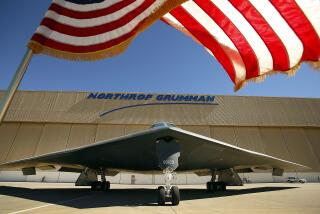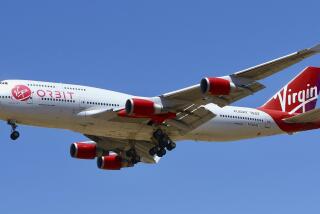Air Force Contract Means 500 New Jobs at McDonnell Plant in Huntington Beach
- Share via
McDonnell Douglas Corp.’s victory in securing an Air Force contract to build at least seven modified Delta II rockets will create about 500 new jobs at the giant aerospace contractor’s Huntington Beach subsidiary, a spokeswoman said Wednesday.
The contract--valued between $316.5 million and $734.2 million--also opens the door for McDonnell Douglas Astronautics Co. to increase its sales of the three-stage rockets to commercial clients--mainly private communications companies.
In addition to the seven Deltas ordered by the Air Force, the company has firm orders for eight more of the rockets: four from NASA and four from commercial clients, the spokeswoman said. She declined to identify the commercial customers.
The commercial version of the rockets runs about $50 million.
McDonnell Douglas Astronautics has been beefing up its Delta production line for the past year because of the Delta orders from NASA and now employs about 900 production workers and engineers on the program in Huntington Beach. An additional 300 workers are employed at Delta launching facilities at Cape Kennedy and Vandenburg Air Force Base in California, the spokeswoman said.
She said additional hiring for the Air Force contract would be equally divided between engineers and production workers and would be done gradually over the next year or so. The Huntington Beach plant employs 6,100 workers, up from about 5,000 a year ago. At its peak in the late 1960s, the facility employed about 8,500.
The basic Air Force contract announced Wednesday calls for McDonnell Douglas Astronautics to build seven modified Delta rockets over the next three years, at a price of $316.5 million. The rockets--called medium launch vehicles, or MLVs--will be modified to increase their power, enabling them to boost heavier satellites than in the past. The Delta II will be used primarily to launch Air Force Global Positioning System satellites that will enable ground and air forces to accurately pinpoint their locations.
The Air Force also has options to purchase up to 13 additional Deltas by 1992, which would bring the total value of the contract to $669.2 million. Additional incentive payments of up to $65 million would increase the total value of the pact to $734.2 million. In securing the contract, McDonnell Douglas defeated two other bidders, the Martin Marietta Corp. of Denver and a division of the General Dynamics Corp. in San Diego.
“We’re pleased the Air Force has chosen McDonnell Douglas for its MLV,” said C. James Dorrenbacher, vice president and general manager of McDonnell Douglas Astronautics.
“For more than 25 years, the Delta has been the workhorse of space, and we’re glad to continue that tradition.”
Although the contract is a major one, it will not require any physical expansion of the Huntington Beach plant, the spokeswoman said.
The company began work on a Delta final assembly facility in Pueblo, Colo., in November and expects to open that plant next month. Employment there, the spokeswoman said, should peak at about 200 by the end of next year.
With the exception of rocket engines and other parts that are purchased from subcontractors, all the components of the Delta II booster rockets are manufactured in Huntington Beach and will be shipped to
Colorado for final assembly, the spokeswoman said.
In addition to the immediate financial boost, the Air Force contract is important, she said, because McDonnell Douglas Astronautics officials see it as the means to “open the production line to make it easier” to build and market Deltas for commercial customers.
“We already have started discussions,” she said, “and can confirm four definite orders for Deltas to be used for commercial satellites.”
The spokeswoman said it is too early to tell whether commercial sales of the rocket boosters would create an additional employment demand at the Huntington Beach facility.
More to Read
Inside the business of entertainment
The Wide Shot brings you news, analysis and insights on everything from streaming wars to production — and what it all means for the future.
You may occasionally receive promotional content from the Los Angeles Times.










